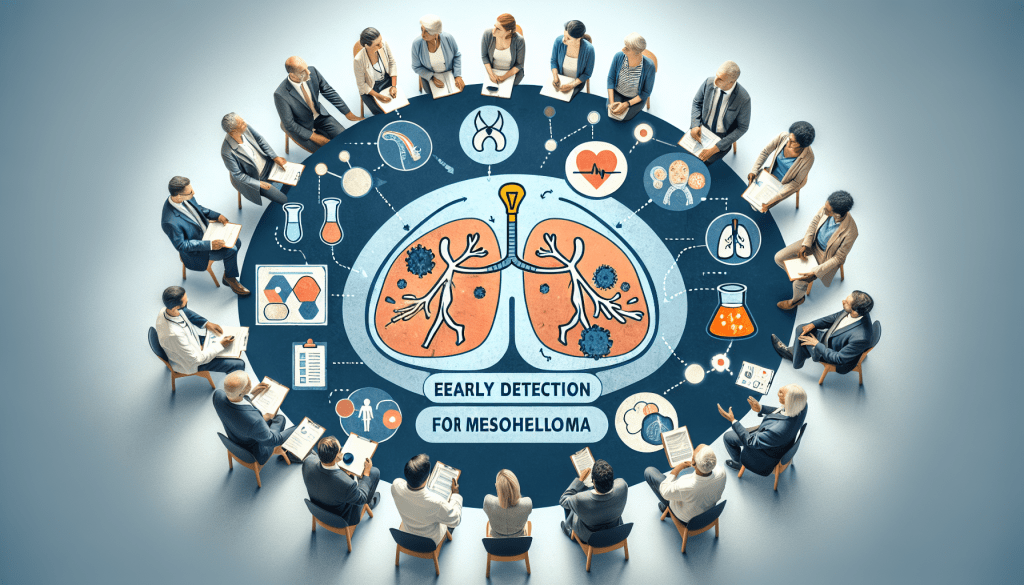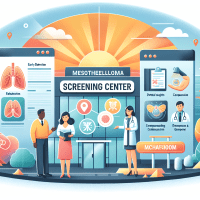
Mesothelioma Early Detection Methods: A Compassionate Journey
Hi, I’m a registered oncology nurse with over 10 years of experience, and I’m here to share what I’ve learned about mesothelioma early detection methods. I understand how overwhelming a diagnosis can be, and I want you to know that you aren’t alone. Together, we can walk through the challenges, the uncertainties, and the essential steps to ensure early action and care, blending both factual insight and heartfelt support on this journey.
Understanding Mesothelioma and the Importance of Early Detection
Mesothelioma is a rare cancer that primarily affects the lining of the lungs. Early detection can often make a significant difference in treatment choices and outcomes. In this talk, I want to share actionable information on various diagnostic tests available, and yet also address the emotional impact that comes with the process. With therapies evolving, understanding your options is crucial, whether it’s through mesothelioma early detection tests, imaging scans, or blood tests.

Diagnostic Tools and Techniques: What to Expect
When it comes to early detection, there is a range of tools used by medical professionals. Here are a few key highlights:
Imaging Scans
Doctors typically use chest X-rays and CT scans to spot abnormalities in the lung lining. These imaging techniques can detect unusual spots or buildup, which could be the first sign of mesothelioma. Advanced imaging, like PET scans, might also be used to determine whether the cancer has spread.
Blood Tests
Emerging blood tests aim to identify biomarkers that are specific to mesothelioma. These tests are especially promising as a non-invasive method for early detection. While no single test is definitive yet, combining blood tests with imaging results can guide further investigation.
Biopsies and Tissue Sampling
Various biopsy techniques, including thoracoscopy and thoracentesis, are used to collect tissue or fluid samples. Understanding these methods can ease anxiety, as it helps demystify what happens during diagnosis. Let me explain:
- Thoracoscopy: A minimally invasive procedure where a small camera is inserted between the ribs to examine the pleura and collect tissue samples.
- Thoracentesis: A procedure to remove excess fluid from the chest which can then be analyzed for cancer cells.
Staging and What It Means
Once a diagnosis is made, mesothelioma is usually staged from 1 to 4. In Stage 1, the cancer is localized and more manageable, while Stage 4 indicates a more advanced spread which requires comprehensive treatment strategies. The stage helps guide clinicians towards the best treatment approach, balancing aggressive action with quality of life considerations.
A Closer Look at Early Detection Methods
There is no one-size-fits-all test for mesothelioma. Instead, a combination of mesothelioma early detection tests is often used to build as clear a picture as possible. Here, I’ll detail some advanced methods:
Mesothelioma Screening Services
Screening services, available in some specialized centers, focus on high-risk groups, particularly those with known asbestos exposure. These centers often offer a series of tests designed to catch early signs of mesothelioma, giving hope for early intervention.
Non-Invasive Testing Options
Given the sensitivity of undergoing invasive tests, non-invasive mesothelioma detection tests, such as refined blood panels and imaging scans, are continuously being improved. For many, this means less physical stress and quicker results, though they are typically used as a preliminary approach before more invasive diagnostics are considered.
Navigating the Emotional Landscape
When discussing medical tests, it is essential to acknowledge the emotional journey they often accompany. Receiving any test result can be anxiety-inducing. I encourage you to allow yourself space to feel your emotions while also seeking professional help when needed.
Managing Anxiety and Fear
From my own experience, I have learned that embracing community and professional support can greatly help manage the anxiety that accompanies mesothelioma screening. Consider counseling services, both medical and psychological, and support groups where you can share your story and hear from others who understand.
Building a Support Network
It is vital to communicate openly with loved ones about your feelings and needs. Be it family, friends, or other patients, creating a robust support network can help alleviate the isolation loneliness often accompanying such a diagnosis. I found that simple conversations, honest words, and shared experiences lighten the burden immensely. For more insights into support techniques, you might find our article on mesothelioma treatment options helpful.
A Personal Reflection: From My Heart to Yours
In my years of caring for mesothelioma patients, I’ve seen the power of early detection in giving hope and direction. Each test, each procedure, is more than a clinical step—it’s a sign that you are not alone in this journey. I encourage you to stay informed, ask questions, and lean on those who care. Together, we can face the challenges with both compassion and courage.
Visualizing the Journey: A Diagrammatic Overview
Imagining the diagnostic process as a flowchart can help clarify the steps ahead. Consider the following table that outlines a typical pathway:
| Step | Description |
|---|---|
| Initial Screening | Basic imaging and symptom evaluation. |
| Advanced Testing | Detailed imaging, blood tests, and possible biopsies. |
| Diagnosis | Combining test results to determine stage. |
| Treatment Planning | Discussing options tailored to the stage and patient needs. |

Next Steps and Additional Resources
If this information has touched you, here are some practical actions you can consider:
- Schedule a Comprehensive Screening: If you have a history of asbestos exposure or suspect symptoms, speak with your healthcare provider about the possibility of comprehensive screening services.
- Educate Yourself and Your Loved Ones: Use reputable resources such as the National Cancer Institute and the American Cancer Society for further reading.
- Seek Emotional Support: Whether it’s joining a support group or speaking with a counselor, addressing your emotional well-being is just as important as managing your physical health.
- Connect with Specialists: Look for NCI-designated cancer centers or mesothelioma specialists to explore your treatment options in depth.
For further insights on handling the emotional challenges of this diagnosis, you might also be interested in our article on coping with mesothelioma.
Transparency and Support
I want you to know that the support provided here is rooted in compassion and a genuine desire to help. Our website is supported by various unbiased sources and community contributions, allowing us to offer this comprehensive information at no additional cost to you. The goal is to empower you with knowledge and to guide you through every step of this challenging journey without feeling overwhelmed by commercial interests.
Final Thoughts: A Path Forward
Every test result, every consultation, and every shared experience is a step towards a better understanding of mesothelioma. I encourage you to approach your diagnosis as a journey—one filled with small victories and important lessons. Remember, early detection is not just about medical procedures; it’s also a pathway to hope, strengthened by the support of those who truly care about your well-being.
Information on treatment guidelines is current as of May 2025. Please consult your healthcare provider for advice tailored to your specific condition.
Thank you for trusting me to be a part of your journey. Together, we will strive for clarity, compassion, and steadfast support as you navigate the challenges ahead.






